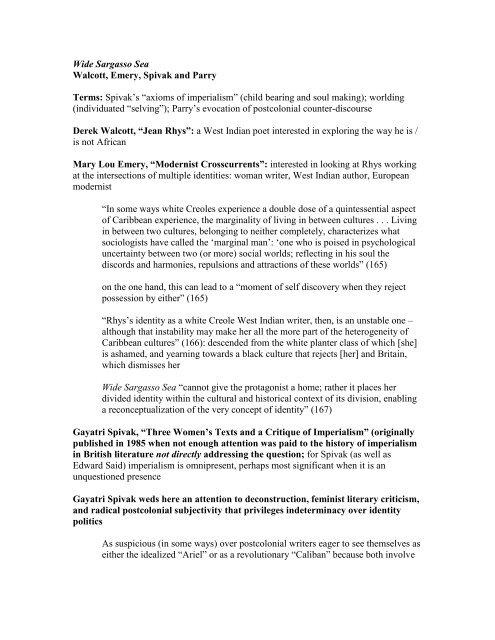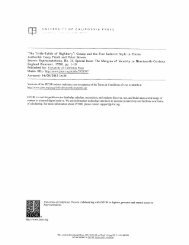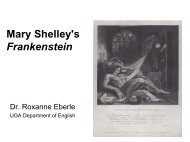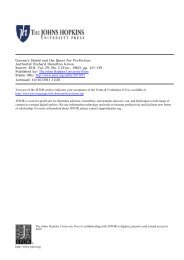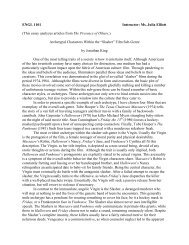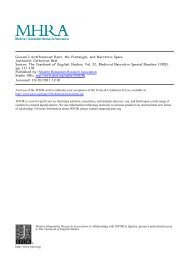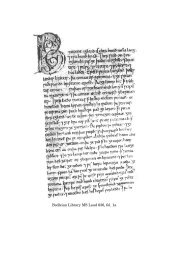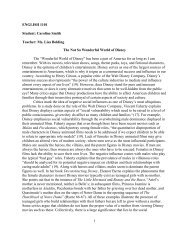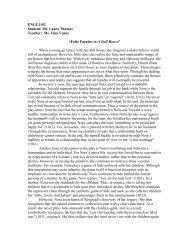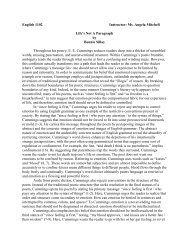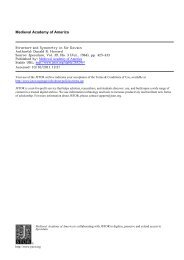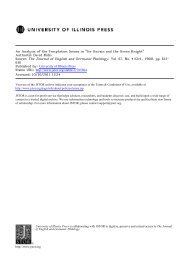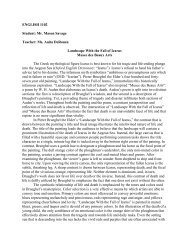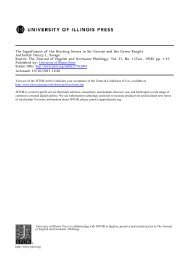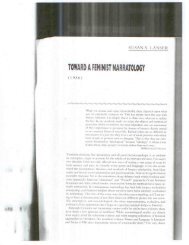Spivak and Parry Notes
Spivak and Parry Notes
Spivak and Parry Notes
Create successful ePaper yourself
Turn your PDF publications into a flip-book with our unique Google optimized e-Paper software.
Wide Sargasso Sea<br />
Walcott, Emery, <strong>Spivak</strong> <strong>and</strong> <strong>Parry</strong><br />
Terms: <strong>Spivak</strong>’s “axioms of imperialism” (child bearing <strong>and</strong> soul making); worlding<br />
(individuated “selving”); <strong>Parry</strong>’s evocation of postcolonial counter-discourse<br />
Derek Walcott, “Jean Rhys”: a West Indian poet interested in exploring the way he is /<br />
is not African<br />
Mary Lou Emery, “Modernist Crosscurrents”: interested in looking at Rhys working<br />
at the intersections of multiple identities: woman writer, West Indian author, European<br />
modernist<br />
“In some ways white Creoles experience a double dose of a quintessential aspect<br />
of Caribbean experience, the marginality of living in between cultures . . . Living<br />
in between two cultures, belonging to neither completely, characterizes what<br />
sociologists have called the ‘marginal man’: ‘one who is poised in psychological<br />
uncertainty between two (or more) social worlds; reflecting in his soul the<br />
discords <strong>and</strong> harmonies, repulsions <strong>and</strong> attractions of these worlds” (165)<br />
on the one h<strong>and</strong>, this can lead to a “moment of self discovery when they reject<br />
possession by either” (165)<br />
“Rhys’s identity as a white Creole West Indian writer, then, is an unstable one –<br />
although that instability may make her all the more part of the heterogeneity of<br />
Caribbean cultures” (166): descended from the white planter class of which [she]<br />
is ashamed, <strong>and</strong> yearning towards a black culture that rejects [her] <strong>and</strong> Britain,<br />
which dismisses her<br />
Wide Sargasso Sea “cannot give the protagonist a home; rather it places her<br />
divided identity within the cultural <strong>and</strong> historical context of its division, enabling<br />
a reconceptualization of the very concept of identity” (167)<br />
Gayatri <strong>Spivak</strong>, “Three Women’s Texts <strong>and</strong> a Critique of Imperialism” (originally<br />
published in 1985 when not enough attention was paid to the history of imperialism<br />
in British literature not directly addressing the question; for <strong>Spivak</strong> (as well as<br />
Edward Said) imperialism is omnipresent, perhaps most significant when it is an<br />
unquestioned presence<br />
Gayatri <strong>Spivak</strong> weds here an attention to deconstruction, feminist literary criticism,<br />
<strong>and</strong> radical postcolonial subjectivity that privileges indeterminacy over identity<br />
politics<br />
As suspicious (in some ways) over postcolonial writers eager to see themselves as<br />
either the idealized “Ariel” or as a revolutionary “Caliban” because both involve
assuming an identity constructed from the “axioms of imperialisms”; the<br />
unassimilated “native” (799-800)<br />
“claiming to be Caliban legitimizes the very individualism that we must<br />
persistently attempt to undermine from within” (800)<br />
Sees in the Anglo-American feminist exaltation of individuality <strong>and</strong> agency a<br />
dangerous corollary in imperialist ideology which underpins (<strong>and</strong> is created by)<br />
nineteenth-century English literature<br />
<strong>Spivak</strong> contesting feminist assertions about literature that ignore the “fact” of<br />
imperialism <strong>and</strong> the ways in which many nineteenth-century women writers exalt<br />
individualist agency without acknowledging the ways in which such an agenda<br />
supports the imperialist project: from the post-colonialist perspective white women<br />
are not necessarily separate from structures of power that oppress, but rather part<br />
of those structures<br />
<strong>Spivak</strong> interested in tracing out the ways that Jane Eyre (a canonical text of<br />
female individualism) depends upon the “axioms of imperialism,” which readers<br />
then uncritically celebrate (798)<br />
a larger critique of our privileging of the “female subject”; a “worlding” which<br />
relies upon the simultaneous "unworlding" of the "Other"<br />
addresses the text <strong>and</strong> not Bronte herself; “my readings here do not seek to<br />
undermine the excellence of the individual artist” (799)<br />
“the readings will incite a degree of rage against the imperialism narrativization of<br />
history, that it should produce so abject a script for her. I provide these assurances<br />
to allow myself some room to situate feminist individualism in its historical<br />
determination rather than simply to canonize it as feminism as such” (799)<br />
argues that the imperialist project insists on either "childbearing" or "soul<br />
making" both of which are dependent upon excising the "native female" (799)<br />
reads opening scene as indicative of Jane's "self-marginalized uniqueness"<br />
with the reader as "accomplice" (800)<br />
Reads Jane as having to move from “counter family” (<strong>and</strong> outsider) to “family-inlaw”;<br />
a move that requires the immolation of Bertha, whose “Otherness” leaves her<br />
subject to be excised from her marriage to Rochester; "other" because she exists on a<br />
human/animal frontier (801); notes that the novel insists upon "a good greater than the<br />
letter of the Law"; a "divine injunction"<br />
The novel achieves both child bearing (i.e. Jane) <strong>and</strong> soul making (St. John),<br />
which maintains the male/female <strong>and</strong> public/private binary (803
Reading of Wide Sargasso Sea<br />
<strong>Notes</strong> that Rhys keeps Bertha’s “humanity” <strong>and</strong> “sanity as a critic of imperialism,<br />
intact” (803)<br />
But argues that Rhys confines Bertha within the script of imperial identity: “Rhys<br />
makes Antoinette see her self as Other, Bronte’s Bertha” (804)<br />
In doing so she allows Jane her idealized “feminist individualism” (804); a<br />
necessary sacrifice<br />
Reads it as a Narcissus story: Antoinette cannot be mirrored by Tia, nor can Jane<br />
be mirrored by Bertha: “the Other that cannot be selfed, because [of] the fracture<br />
of imperialism” (804)<br />
And [Rochester] as a victim of a failed Oedipal exchange, without the<br />
achievement of the patronymic (805)<br />
Sees the representation of Christophine as articulating the boundaries of its own<br />
discourse (806)<br />
While she functions as a critic <strong>and</strong> occupies the space of “commodified person,” she<br />
leaves the novel without achieving change or reform<br />
This marks the text, for <strong>Spivak</strong>, as imperialist since “No perspective critical of<br />
imperialism can turn the Other into a self, because the project of imperialism has<br />
always already historically refracted what might have been the absolutely Other<br />
into a domesticated Other that consolidates the imperialist self” (807)<br />
If Christophine achieved selfhood, the novel could not criticize<br />
imperialism (would also be elevating individualism)<br />
<strong>Spivak</strong> poses a particularly interesting reading of Frankenstein because she argues, in<br />
effect, that the novel doesn’t celebrate agency but rather questions the very possibility of<br />
a unified subjectivity<br />
The Creature – as she reads him – is evidence of the impossibility of marrying<br />
theoretical reason, practical reason, <strong>and</strong> aesthetic appreciation (categories of the<br />
self posited by Emmanuel Kant – a nineteenth-century philosopher)<br />
her reading also suggests that we become what we are treated as – the<br />
Creature is treated as “monstrous”, hence he becomes a “monster”<br />
interested in the way in which the novel fails to represent the unified subject so<br />
celebrated in Western literature – at the same time she credits Mary Shelley with<br />
little credit for this achievement; the text is seen as working autonomously –
separately from the putative “author” – the text emerges out of a set of<br />
social, political, <strong>and</strong> aesthetic forces that the author “channels” more than<br />
“controls”<br />
<strong>Spivak</strong> is explicitly uninterested in the author’s intention; she is interested in the text’s<br />
“usefulness” in exploring the dynamics of individualism <strong>and</strong> imperialism (810-811)<br />
<strong>Spivak</strong> reads the novel as a type of re-writing of The Tempest only here the<br />
“Other” (the Creature/Caliban) refuses to be “selfed” (as Safie has been or<br />
Antoinette in Wide Sargasso Sea); he cannot be brought under the law [<strong>and</strong> we<br />
can tell here, that <strong>Spivak</strong> is rooting for the Creature – she celebrates his<br />
refusal to be brought under the rule of law]<br />
in a persuasive reading of the novel’s conclusion, <strong>Spivak</strong> argues that (in fact) the<br />
Creature’s fate remains utterly unknown – “lost in darkness <strong>and</strong> distance”<br />
further supported by the fact that we don’t have evidence of Margaret Saville (the<br />
ideal English female subject) receiving the letters – the frame is open (268)<br />
In a revised version of this essay, <strong>Spivak</strong> reads these texts as “supplements” of each<br />
other because each contains what the other lacks; her refusal to treat the intentionality<br />
of the author as well as her use of the term “supplement” reveals yet another critical<br />
dimension to her work ; a postcolonial feminist, she draws upon deconstruction as<br />
well<br />
Benita <strong>Parry</strong>, [Two Native Voices in Wide Sargasso Sea] (from “Problems in<br />
Current Theories of Colonial Discourse” pub. 1987)<br />
Takes explicit issue with <strong>Spivak</strong>’s deconstructionist response to identity, particularly at<br />
the end of the excerpt:<br />
<strong>Spivak</strong>’s deliberated deafness to the native voice where it is to be heard, is at<br />
variance with her acute hearing of the unsaid in modes of Western feminist<br />
thought . . . in her own writings [she] severely restricts (eliminates?) the space in<br />
which the colonized can be written back into history, even when ‘interventionist’<br />
possibilities’ are exploited through the deconstructive strategies devised by the<br />
post-colonial intellectual. (250)<br />
Antoinette must (in <strong>Spivak</strong>’s articulation) be sacrificed to Jane’s “subjectconstitution”<br />
<strong>and</strong> Christophine cannot be heard at all<br />
In only recognizing Antoinette as playing “the part of the woman from the colonies”<br />
who is silenced <strong>and</strong> “unselved,” <strong>Spivak</strong> (according to <strong>Parry</strong>) misses the opportunity<br />
to hear Christophine, a “native” agent
In <strong>Spivak</strong>’s account “a black female who in WSS is most fully selved, must be<br />
reduced to the status of a tangential figure, <strong>and</strong> a white Creole woman (mis)<br />
construed as the native female produced by the axiomatics of imperialism” <strong>and</strong><br />
sacrificed to them (248)<br />
According to <strong>Parry</strong>, “Christophine subverts the Creole address that would<br />
constitute her as domesticated Other, <strong>and</strong> asserts herself as articulate antagonist of<br />
patriarchal, settler <strong>and</strong> imperialist law” (248)<br />
Does so in her refusal of a patronymic <strong>and</strong> husb<strong>and</strong>; in her protection of<br />
Rochester <strong>and</strong> her articulation of his economic, social <strong>and</strong> political power; <strong>and</strong> in<br />
her use of obeah<br />
<strong>Parry</strong> interested in examining the assertion of a “counter-discourse” (249) in<br />
response to hegemonic interpellation (“worlding” in <strong>Spivak</strong>’s terms):<br />
In <strong>Spivak</strong>’s reconstruction, Christophine’s departure from the story . . . is without<br />
narrative <strong>and</strong> characterological explanation or justice. But if she is read as the<br />
possessor <strong>and</strong> practitioner of an alternative tradition challenging imperialism’s<br />
authorized system of knowledge, then her exit at this point appears both logical<br />
<strong>and</strong> entirely in character. (249)<br />
Christophine “knows from experience that her powders, potions <strong>and</strong> maledictions<br />
are effective in the West Indies, undoes through its excess the rationalist version<br />
valorized by the English, while at the same time acknowledging the boundaries to<br />
the power of her knowledge” (249)


